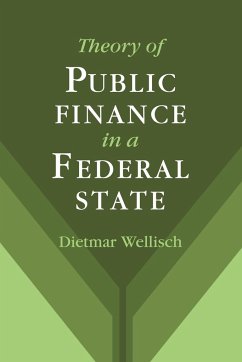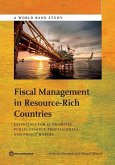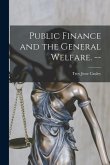This book presents an optimal degree of fiscal decentralization in a federal state.
The central question of this book is whether the assignment of government functions to the individual jurisdictions in a federal state can ensure an optimal allocation of resources and a fair income distribution. The analysis thereby gives a new answer to the old question about the optimal degree of fiscal decentralization in a federal state. It shows that fiscal decentralization is a method to disclose the preferences of currently living and future generations for local public goods, to limit the size of the government, and to avoid excessive public debt finance. While the allocative branch of the government benefits from fiscal decentralization, it is difficult to obtain a distribution of incomes that differs from the outcome that the market brings along.
Review quote:
"I highly recommend this work both for the excellent synthesis of the existing works on fiscal decentralization and the important contributions to issues of public finance under conditions of factor mobility...it is a tremendous contribution to the field and a must read for scholars of federalism and decentralization."
Publius
Table of contents:
Acknowledgments; 1. Fiscal decentralization: benefits and problems; 2. Locational efficiency and efficiency-supporting tax systems; 3. Perfect interregional competition; 4. Interregional tax competition for mobile capital; 5. Optimal structure of local governments; 6. Incentive equivalence through perfect household mobility; 7. Efficiency and the degree of household mobility; 8. Decentralized redistribution policy; 9. Decentralization and intergenerational problems; 10. Informational asymmetry between the regions and the center; 11. Conclusions; References; Index.
The central question of this book is whether the assignment of government functions to the individual jurisdictions in a federal state can ensure an optimal allocation of resources and a fair income distribution. The analysis thereby gives a new answer to the old question about the optimal degree of fiscal decentralization in a federal state. It shows that fiscal decentralization is a method to disclose the preferences of currently living and future generations for local public goods, to limit the size of the government, and to avoid excessive public debt finance. While the allocative branch of the government benefits from fiscal decentralization, it is difficult to obtain a distribution of incomes that differs from the outcome that the market brings along.
Review quote:
"I highly recommend this work both for the excellent synthesis of the existing works on fiscal decentralization and the important contributions to issues of public finance under conditions of factor mobility...it is a tremendous contribution to the field and a must read for scholars of federalism and decentralization."
Publius
Table of contents:
Acknowledgments; 1. Fiscal decentralization: benefits and problems; 2. Locational efficiency and efficiency-supporting tax systems; 3. Perfect interregional competition; 4. Interregional tax competition for mobile capital; 5. Optimal structure of local governments; 6. Incentive equivalence through perfect household mobility; 7. Efficiency and the degree of household mobility; 8. Decentralized redistribution policy; 9. Decentralization and intergenerational problems; 10. Informational asymmetry between the regions and the center; 11. Conclusions; References; Index.








